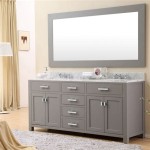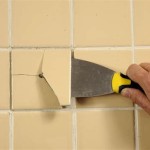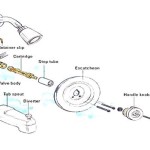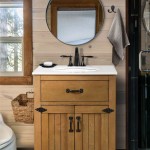Rust In My Bathroom Sink: Essential Aspects to Consider
Discovering rust in your bathroom sink can be a frustrating and unsightly problem. However, understanding the causes and taking prompt action can help you effectively address the issue and prevent its recurrence.
Causes of Rust Formation
Rust is an iron oxide that forms when iron or steel comes into contact with oxygen and moisture. In a bathroom sink, this reaction can occur due to:
*- Iron or Steel Components: Some bathroom sinks contain iron or steel parts, such as the drain stopper or overflow plate.
- Hard Water: Water with high mineral content, particularly iron and calcium, can deposit these minerals on sink surfaces, promoting rust formation.
- Corrosion: Over time, exposure to moisture and acidic substances (e.g., household cleaners) can corrode the protective finish on metal components, making them susceptible to rust.
Consequences of Rust
Besides its unsightly appearance, rust can have several negative consequences:
*- Surface Damage: Rust can stain and damage the sink's surface, making it difficult to clean.
- Contamination: Rust particles can flake off into the water, contaminating it with iron oxide.
- Health Concerns: Consuming water contaminated with iron oxide can potentially pose health risks, although the levels found in bathroom sinks are typically low.
Rust Removal and Prevention
Removing and preventing rust in a bathroom sink involves the following steps:
*- Cleaning the Surface: Use a rust-dissolving cleaner or a vinegar solution to remove existing rust. Apply the solution, let it sit for an appropriate time, and scrub the surface with a sponge or brush.
- Protecting the Surface: Once the rust is removed, apply a water-resistant sealant or clear nail polish to the surface to protect it from further corrosion.
- Addressing Iron or Steel Components: If the rust is originating from iron or steel components, consider replacing them with stainless steel or other non-corrosive materials.
- Softening Hard Water: Install a water softener to remove minerals from your water supply and reduce the risk of further rust formation.
Professional Assistance
If the rust problem is extensive or persists despite your efforts, it is advisable to seek professional assistance. A plumber can inspect your sink, determine the root cause of the issue, and provide appropriate recommendations for repair or replacement.

How To Remove Rust Stains From Toilets Tubs And Sinks

How To Remove Rust Stains From Sink Tub Mr Handyman

I Have Rust Near The Overflow Hole On My Bathroom Sink How Do Fix Hometalk

Rusting Bathroom Sink Hometalk

How Did I Get Rust Stains In My Sink Benjamin Franklin Dallas

How To Get Rid Of Iron And Rust Stains Once For All Water Right

Common Housekeeping Conundrums Rust In Bathtubs And Sinks

What Can I Do With Spot Of Rust On The Chrome My Bathroom Sink Hometalk

How To Remove Rust From Stainless Steel Advice Bob Vila

How To Remove Rust Stains From A Porcelain Tub Or Sink Cabana State Of Mind
Related Posts







